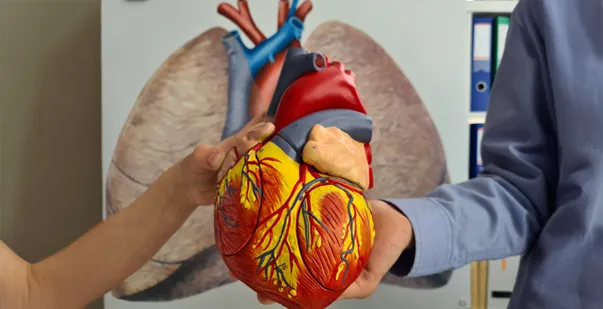Heart monitors are devices that track your heart’s activity. They help doctors determine if your heart is beating normally or if something is wrong. There are different types of heart monitors, including from those you wear for a day to ones that track your heart for weeks. Regardless of the type, their primary goal is to monitor your heart. In this blog, we will explain how heart monitors work, who might need them, and what to expect when using one.
Master ACLS Now
Get ACLS certified with confidence
What is a Heart Monitor?
A heart monitor is a device that measures the activity of your heart, primarily focusing on its rhythm and electrical signals. Your heart beats in a regular pattern to pump blood throughout your body. A heart monitor helps doctors determine if your heart is beating normally. Arrhythmias (irregular heartbeats) or other issues that may lead to heart attacks can be detected early with these monitors.
Heart monitors can pick up on irregular heart rhythms that you may not notice. These irregularities can be early warning signs of heart conditions. If you’ve had heart surgery or started new medications, a heart monitor helps doctors see how your heart is responding to these treatments. Heart monitors provide continuous updates on your heart’s condition, making it easier to adjust treatments quickly if needed. Now that we know what a heartknow heart monitor means, let us see how to use one.
Read More: An Ultimate Guide to Cardiac Conduction System
How Does a Heart Monitor Work?
Heart monitors use sensors placed on your body to measure your heart’s electrical activity. The electrical signals from your heart are sent to the monitor, which creates a graph or reading that shows how your heart is beating.
The most common method is called an electrocardiogram (ECG or EKG). In an ECG, electrodes are placed on your chest, arms, and legs to record the electrical impulses generated by your heart. This test is usually done in a doctor’s office or hospital and provides a snapshot of your heart’s activity at that moment.
Types of Heart Monitors
Heart monitors provide vital information about the health of your heart. They allow doctors to monitor your heart continuously, whether you are awake, asleep, active, or at rest. There are several types of heart monitors, each serving a different purpose. Let’s explore the different types of heart monitors:
Holter Monitors
A Holter monitor is a portable device worn for 24 to 48 hours to record your heart’s activity continuously. It’s often used when doctors suspect irregular heartbeats that might not show up in a regular ECG. The monitor is connected to electrodes placed on your chest. You can go about your daily activities while wearing it, but you cannot get it wet. After the monitoring period, your doctor reviews the data to detect any heart rhythm problems.
Event Monitors
Unlike Holter monitors, event monitors are worn for longer periods, sometimes up to 30 days. They record heart activity only when you experience symptoms or press a button. Event monitors are helpful for identifying irregularities that occur less frequently.
A 30-day heart monitor tracks heart rate for 30 days. Types of 30-day heart monitors include loop monitors, which continuously track your heart’s rhythm but only save recordings when there’s an abnormal heartbeat.
Mobile Cardiac Telemetry (MCT)
This heart monitor type records your heart’s activity in real-time and transmits data to a remote monitoring center. MCT devices can catch irregular heartbeats instantly, even if you don’t notice symptoms.
A common MCT device is the BioTel Heart Monitor, which sends data wirelessly to your doctor. While there have been BioTel heart monitor complaints about discomfort or issues with the device’s sensitivity, BioTel monitors provide reliable real-time heart monitoring.
Implantable Loop Recorders (ILR)
ILRs are small devices implanted under the skin that continuously monitor your heart for up to three years. They are recommended when long-term monitoring is necessary, and other types of heart monitors can’t capture enough data.
Hospital Heart Monitors
Heart monitors are used in a hospital to continuously track patients’ heart activity, especially after surgery or during intensive care. These monitors offer real-time, detailed readings of your heart’s activity.
What to Expect When Using a Heart Monitor
Now that we know the different heart monitor types, let’s see what to expect while using one. If your doctor recommends using a heart monitor, it’s necessary to understand what to expect during the monitoring process.
Wearing the Monitor
When your doctor suggests using a heart monitor, you may need to wear it for different periods, depending on the type. Some monitors are worn for just a few hours, while others might need to be worn for days or even weeks.
The monitor will usually be attached to your chest using sticky pads called electrodes, which pick up the signals from your heart. While it may feel a bit strange at first, most monitors are small and lightweight. Some are so small they can be clipped to your belt or carried in your pocket, making it easy to continue with your daily activities.
Activity Log
While wearing the heart monitor, your doctor might ask you to keep a diary of your activities and feelings. For example, if you feel dizzy, have chest pain, or experience a fluttering sensation in your heart, you would write it down. You will also note activities like walking, eating, or resting.
This log helps doctors match any unusual heart activity with what you were doing at the time. This helps them better understand what might be triggering changes in your heart’s rhythm.
Follow-up
Once your monitoring period is over, you’ll return the heart monitor to your healthcare provider. Your doctor or a specialist will download the data from the device and carefully analyze it.
During a follow-up appointment, your doctor will explain the data. They will go over any issues that were detected and discuss any necessary next steps, like treatments or further testing, based on the monitoring results.
Who Needs a Heart Monitor?
Every year, about 82.6 million people of adults in the U.S. experience some form of cardiovascular disease, making heart health a top priority. Heart monitors can be recommended for anyone who has symptoms that may be related to heart issues. Some of the common reasons your doctor might suggest heart monitoring include:
Unexplained Fainting
If you often pass out or feel dizzy without a clear reason, your doctor might suggest a heart monitor. It will check if you have an irregular heartbeat. Doctors can understand why you’re fainting and recommend the right treatment by looking at the abnormal patterns.
Palpitations
When you feel like your heart is beating too fast, skipping beats, or pounding hard in your chest is called palpitations. A heart monitor can record these episodes and show if they are due to an irregular heart rhythm. It can be harmless sometimes. It might also indicate that it is a heart condition that needs attention.
After a Heart Attack
After a heart attack, you need to see how your heart is healing. A heart monitor helps doctors check if your heart is working properly and if there are any signs of trouble. It can detect abnormal rhythms or other issues that may need treatment.
High Blood Pressure or Chest Pain
High blood pressure and chest pain can be warning signs of heart disease. A heart monitor can catch early signs of heart trouble by tracking how your heart behaves over time. This helps doctors detect problems before they become serious.
Before and After Surgery
Heart monitoring is common for patients undergoing heart surgery. Before surgery, it helps doctors understand your heart’s condition and any risks involved. After surgery, monitoring ensures that your heart is responding well and recovering as expected. It helps detect any complications early, allowing doctors to take quick action if needed.
Read More: What is the difference between cardiac arrest and a heart attack?
Are Heart Monitors Covered by Insurance?
One of the most common concerns patients have is whether heart monitors are covered by insurance. The short answer is that most heart monitors are covered by insurance, but this depends on your insurance provider and the type of monitor.
Heart Monitors: Understanding Their Importance for Heart Health
Heart monitors are tools for diagnosing and managing heart conditions. If you learn about the different heart monitors and how they work, you can feel more confident about using them to monitor your heart health. If you have any more questions or concerns about heart monitors, don’t hesitate to consult your doctor. They can guide you through the process and ensure you’re using the right type of heart monitor for your needs. Consider enrolling in a Basic Life Support (BLS) course to learn how to help someone using a heart monitor in case of an emergency.
References:
- https://my.clevelandclinic.org/health/diagnostics/21491-holter-monitor
- https://my.clevelandclinic.org/health/diagnostics/23272-cardiac-event-monitor
- https://boyntonbeach.floridapremiercardio.com/blog/a-cardiologist-explains-what-a-heart-monitor-is-used-for/







